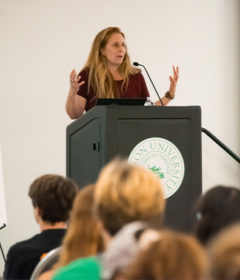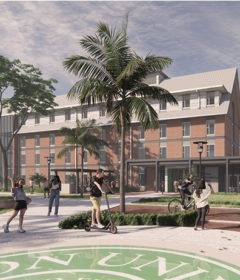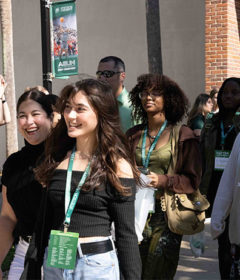National recognition for community service
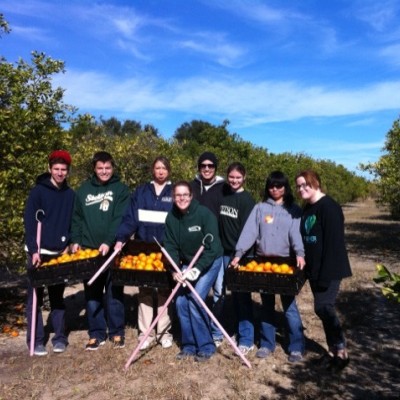
Stetson University has been named to the President’s Higher Education Community Service Honor Roll for the sixth consecutive year for its commitment to bettering the world through community service and service learning.
Stetson is one of 642 colleges and universities nationwide to receive the honor given by the Corporation for National and Community Service (CNCS). It has been named to the honor roll every year since the program began in 2006.
“We are so honored to be included on the President’s Higher Education Community Service Honor Roll again this year,” said Savannah-Jane Griffin, associate director of Community Engagement. “Community service and outreach have long been a part of Stetson’s mission, and in 2011, we took that commitment further by making ‘fostering civic and community engagement’ a top priority in our new three-year strategic plan.”
In the 2010-11 academic year, 2,421 Stetson students provided 90,942 hours of community service –mentoring and tutoring at-risk youth, providing pro bono legal service, removing invasive plant species from a national wildlife refuge and state parks, teaching English to migrant farm workers and advocating for social justice and human rights. Through the Volunteer Income Tax Assistance Program students provided 104 mid- to low-income residents with tax-return assistance. Stetson embraced the New Horizons Service Dogs Program, in which 20 students, faculty, staff and alumni raised service puppies for training and partnering with disabled individuals. Students raised more than $53,000 for disaster relief, cancer research, scholarships and nonprofit organizations.
The university also has a major commitment to service-learning through its academic courses; faculty members involve their students in the community to address real-world problems. Service is infused into the life of the university under multiple academic and co-curricular programs and offices including the Center for Community Engagement, the Community Engagement Council, the Bonner Scholars program and the Marchman Program for Civic and Social Responsibility, along with partnerships with organizations including Florida Campus Compact and AmeriCorps.
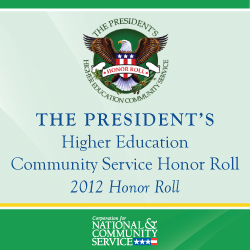 “Beyond community service, students donated blood; hosted professional development workshops for community partners; recycled 234,000 pounds of paper, cardboard, aluminum and plastic; circulated petitions; and marched, walked, danced, ran and fasted for causes,”Griffin said. “Students made a difference on campus, in the community and around the globe.”
“Beyond community service, students donated blood; hosted professional development workshops for community partners; recycled 234,000 pounds of paper, cardboard, aluminum and plastic; circulated petitions; and marched, walked, danced, ran and fasted for causes,”Griffin said. “Students made a difference on campus, in the community and around the globe.”
CNCS oversees the Honor Roll in collaboration with theU.S.departments of Education and Housing and Urban Development, Campus Compact, and the American Council on Education. Honorees are chosen on factors such as the scope and innovation of service projects, the extent to which service-learning is embedded in the curriculum, the school’s commitment to long-term campus-community partnerships, and measurable community outcomes as a result of the service.
“Through service, these institutions are creating the next generation of leaders by challenging students to tackle tough issues and create positive impacts in the community,” said Robert Velasco, acting CEO of CNCS. “We applaud the Honor Roll schools, their faculty and students for their commitment to make service a priority in and out of the classroom. Together, service and learning increase civic engagement while fostering social innovation among students, empowering them to solve challenges within their communities.”
“Preparing students to participate in our democracy and providing them with opportunities to take on local and global issues in their course work are as central to the mission of education as boosting college completion and closing the achievement gap,” said Eduardo Ochoa, the U.S. Department of Education’s assistant secretary for postsecondary education. “The Honor Roll schools should be proud of their work to elevate the role of service-learning on their campuses. Galvanizing their students to become involved in projects that address pressing concerns and enrich their academic experience has a lasting impact – both in the communities in which they work and on their own sense of purpose as citizens of the world. I hope we’ll see more and more colleges and universities following their lead.”
The President’s Higher Education Community Service Honor Roll recognizes higher education institutions that reflect the values of exemplary community service and achieve meaningful outcomes in their communities. Inspired by the thousands of college students who traveled across the country to support relief efforts along the Gulf Coast after Hurricane Katrina, the initiative celebrates the transformative power and volunteer spirit that exists within the higher education community.

